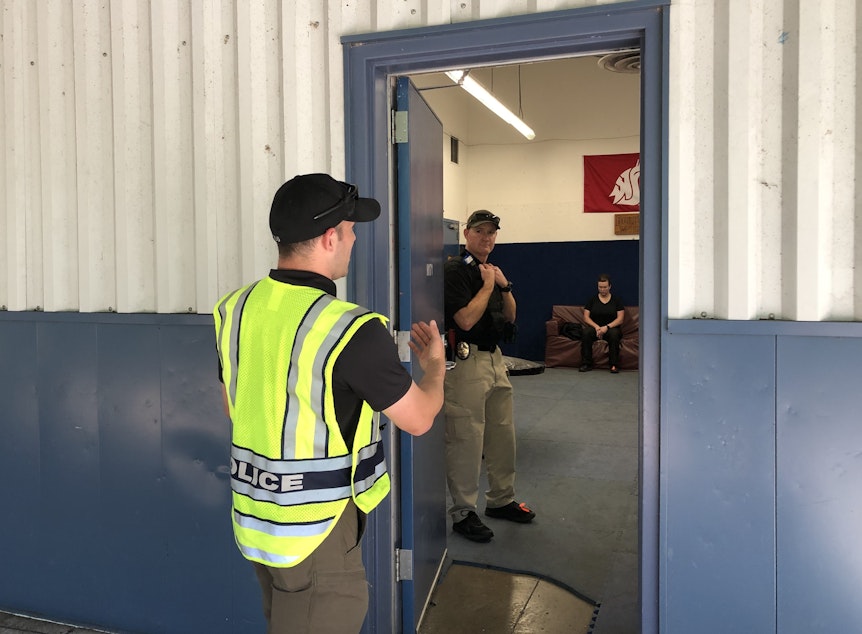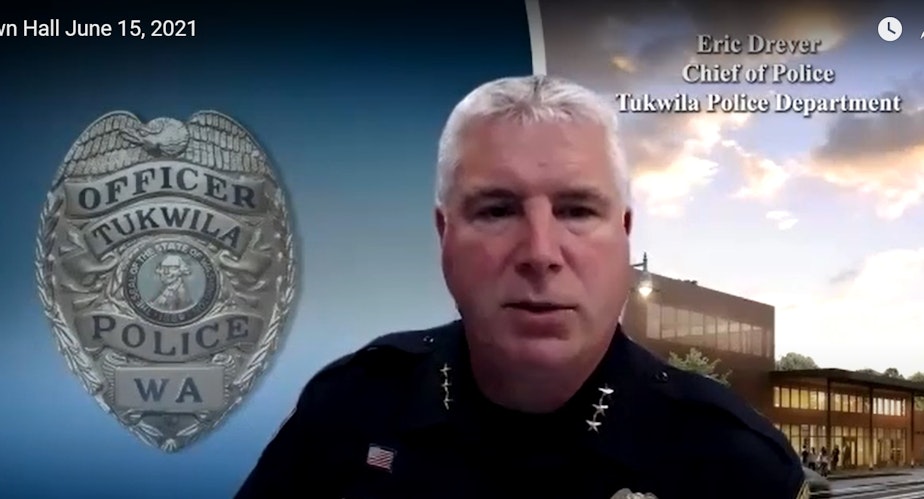How Tukwila is teaming up with community reps as ground shifts around policing

Police departments across Washington state are feeling shockwaves from last summer’s protests, new laws taking effect this month, and staffing shortages. So what comes next?
In one small city in South King County, police say they are asking community representatives to weigh in on every use of force and hiring decision.
They also say a focus on de-escalation has driven down their use of force numbers. The Tukwila Police Department credits Initiative 940, which voters approved in 2018, with fueling these changes.
The Tukwila Police Department has seen a steep drop in its use of force over the past five years. Use of force incidents by police (which can span everything from handcuffing someone to deadly force) have dropped nearly 80% — from 260 in 2016 to 54 last year. Tukwila Police Chief Eric Drever notes that 2016 was the year the department first deployed in-car video, which offered more evidence for use of force investigations.
He said the department has also focused on de-escalation training, which I-940 mandated.
Tukwila Detective James Thompson calls himself a “reality-based training nerd.” He said Washington voters’ passage of Initiative 940 and subsequent legislation helped give more urgency to the training he wanted to create.
Thompson said he was on patrol with the Tukwila Police Department in 2019 when he responded to a call of a man standing outside his ex-girlfriend’s house with a knife. Instead of confronting the man directly, Thompson parked his car some distance away and stood behind it to ask the man what was going on.
Sponsored
“I’m trying to hear him and I finally was just like, 'hey slow down, we’ve got time, what are some resources we have available to us?' …..’hey man what’s your phone number?’“
Over a lengthy phone call, from down the street, Thompson persuaded the man to drop his knife and come toward police. The man just requested that he be allowed to speak to his ex-girlfriend before going to jail.
Thompson said, “His significant other came out, he apologized to her, and was like, ‘alright I’m ready to go.’”
Thompson calls this a successful use of de-escalation tactics, where officers create time, distance and “shielding” (in this case, standing behind the police car) to defuse a situation. He said these outcomes have made him passionate about training his fellow officers.
“We’ve always really wanted to push de-escalation and the importance of that and slowing it down, and actively listening to folks,” he said.
Sponsored
Last month, Thompson and his colleagues from Tukwila helped teach patrol tactics at the state’s Criminal Justice Training Commission in Burien, coaching officers from around the state on how to deal with people in crisis.
De’Sean Quinn is a Tukwila city council member. He has a big-picture view as the elected official on the state’s Criminal Justice Training Commission. And he thinks policing in his diverse city of 20,000 in South King County is headed in the right direction.
“I’ll just have to acknowledge the ground has shifted around law enforcement," Quinn said. "And the question is are you going to be part of — and I truly believe this — that institutions should be part of the solution."
New roles for community representatives
Beyond de-escalation, Initiative 940 also requires every law enforcement agency to create a roster of community representatives, and to update them regularly on any deadly force investigations.
Sponsored
In Tukwila they’ve gone beyond that — they’ve asked those community representatives to review every use of force reported.
Sean Goode is one of the community representatives for Tukwila . He directs the group Choose 180 which works with at-risk young people to keep them out of the court system. Goode said he thought it was important for someone with his perspective to take on this role; at Councilmember Quinn’s suggestion he applied and was accepted.
“Ultimately, I said yes because it’s imperative that there is community representation in these groups that’s reflective of the folks that are often harmed at the hands of law enforcement,” Goode said.
He said reviewing all of Tukwila’s use of force videos and reports left him with mixed emotions.
“There have been clips I’ve watched, where I’ve watched Tukwila police officers be terrifically patient and honor the person who they’re engaging at that particular moment and really lift up their humanity,” he said. “And then I’ve watched other clips where I’m wondering why police are engaged in the first place.”
Sponsored
Like shoplifting cases where Goode said the police response struck him as disproportional to the crime.
Tukwila police chief Eric Drever said he wants community representatives to raise those questions.
“If you see us doing something that makes you scratch your head or you’re wondering why we do something or you just outright think we shouldn’t do something that way — challenge us,” he said. “Have us explain why we’re doing that, and if we can’t explain or there’s a better way to do it, let’s look at better ways to do it.”

Drever said, so far, community representatives have mostly asked questions. But he said just preparing for that review helped police identify some data-collection issues and refine their training. He said if community representatives raise objections to a use of force incident or identify wrongdoing, that information will be included in a report for the command staff that is presented to the City Council, and the department will follow up.
Sponsored
Drever said he’s also asked community members to sit in on every hiring decision the police make.
“And so we’re going over all of our processes and finding areas where we can include the community so that they get a say in how their police department’s operations are run and who is actually being hired as law enforcement.”
He said he’s not aware of any other agencies involving community representatives to this extent. It’s a notable level of collaboration between police and their public.
'Why I'm in this': creating tools between community and law enforcement
Of course it hasn’t been easy – Goode is still a committed advocate of alternatives to policing.
“For me it’s not about policing," Goode said. "It’s about the criminal legal system as a whole. And how do we respond in a way where we’re thinking of public safety more holistically in a way that’s similar to how we think of public health.”
For Chief Drever, the current state of policing is discouraging. He has deep concerns about new state laws restricting how police officers can respond to calls. He’s down 12 positions in his department and struggling to hire people. And he echoes the feelings of betrayal that many officers have expressed as they confront relentless public criticism.
“Anybody in law enforcement would be lying if they say they have not even considered going into another profession and getting out of law enforcement,” he said. “I myself have thought it. But then the flipside is, if we don’t do it, who will?"
The new ideas being tried in Tukwila aren’t necessarily a happy ending. But they might be a start.
As Councilmember Quinn notes, some of the problems police and communities are confronting have a long history. Quinn said when he commuted from Renton to Seattle’s Garfield High School in the 1990’s, he got pulled over by police — a lot.
“The great thing is I’m a calm guy. But I’m a big guy. Big African-American guy, I played football,” Quinn said. “And sometimes, in my interactions, I could tell with law enforcement they were making certain assumptions about who I was and what I was about.”
Quinn said there were times when he felt like he — as a high school student — was having to deescalate the encounter. But he said he’s working to convey that lived experience and build bridges between police and communities.
Quinn said the goal is ensuring his kids don’t have the same police encounters.
“My hope is that my sons, two of them, when they do that maybe there’s more tools that have been co-created with community and law enforcement, so the likelihood goes down that there’s a deadly interaction," he said. "That’s why I’m in this.”
In launching the new review of use of force reports by community representatives, Tukwila police asked four representatives to look at all of the 2020 reports at once. Goode said one concern that community representatives raised was that reviewing all that use of force video was traumatic for them. Chief Drever says he checked with human resources and made sure they have access to the same mental health resources that are available to police department employees.
They’re now asking community members to review use of force reports on a quarterly basis, which Drever said will allow them to incorporate feedback more quickly.
If you have any feedback on this story, you can email me at aradil@kuow.org or find me on Twitter @AmyRadil. Or you can just click the feedback button on the right hand side of this page.




